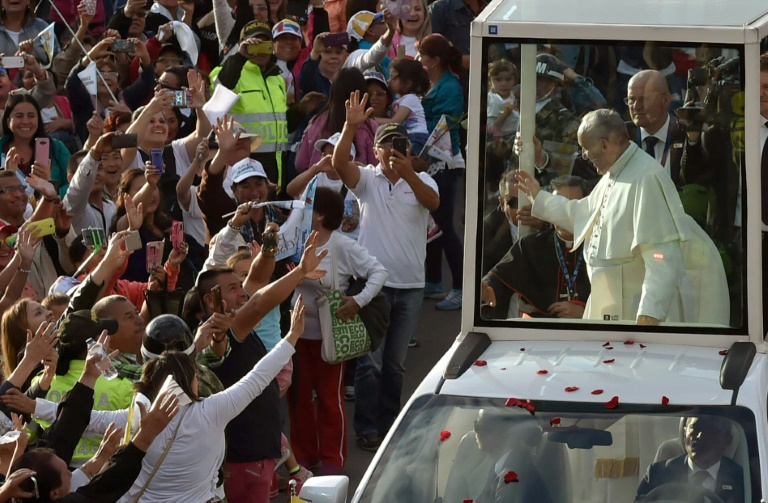Pope Francis landed in Colombia on Wednesday to plead for lasting peace in a country moving towards the end of a half-century war, and praying for stability in its crisis-stricken neighbor Venezuela.
The 80-year-old Argentine pontiff descended from his plane at a military airport in Bogota and was greeted by Colombian President Juan Manuel Santos and a crowd waving white handkerchiefs.
Children in white outfits and red neckerchiefs performed a Colombian “cumbia” dance as Francis greeted the crowd, including civilians and army veterans injured in the conflict.
Smiling, he climbed aboard a white Popemobile which took him through the city center amid deafening cheers from admirers lining the route to the papal mission, the Nunciatura.
There he recited a Hail Mary and a blessing to assembled youths, who responded with a rap and breakdancing. He donned a white wool poncho they gave him as a present.
Francis had called ahead of his trip for a “stable and lasting peace” in Colombia. On arrival, he praised local people for their “heroism.”
“Continue on the path that you have been brave enough to start, which is called heroism,” he told the young people.
“Don’t let yourselves be beaten, don’t let yourselves be fooled. Do not lose joy. Do not lose hope.”
– Peace and concord –
Francis’s trip follows the disarmament of Colombia’s biggest rebel force, the FARC, and a ceasefire by the country’s last remaining guerrilla force, the ELN.
The pope supports Santos in his drive for a “complete peace” to end Latin America’s longest civil war.
But Francis’s first statements after starting the trip were about Venezuela, where a political and economic crisis has caused food shortages, deadly unrest and calls for President Nicolas Maduro to quit.
Francis sent a telegram with “cordial greetings” to Maduro and the Venezuelan people, “praying that all in the nation may promote paths of solidarity, justice and concord.”
– ‘Pope, help Venezuela’ –
Francine Howard, Colombia coordinator for major Venezuelan opposition party Popular Will, said her compatriots would attend the pope’s public masses with signs reading “Pope, help Venezuela.”
But with respect to Francis’s visit, “there is one thing that has made Venezuelans uncomfortable, and that is the call for dialogue” with Maduro’s government, she warned.
Vatican-mediated talks between Venezuela’s government and opposition last year collapsed with the sides accusing each other of bad faith.
– Colombian reconciliation –
Francis’s five-day tour will see him meet people who have suffered on various sides in the Colombian war, Latin America’s longest conflict.
The violence has left 260,000 people confirmed dead, 60,000 unaccounted for and seven million displaced.
“The Holy Father is now in Colombian territory. He has come for a very special purpose: to push us to take the first step to reconciling with one another,” Santos told reporters after welcoming Francis.
– Divisive peace deal –
Despite the pope’s blessing, the peace process has been fraught with division.
Critics of the accord with the FARC say the rebels got off too lightly.
Colombians narrowly rejected that peace deal in a referendum last year.
Francis then tried unsuccessfully to mediate between Santos and the lead opponent of the accord, conservative leader Alvaro Uribe.
A reworked version was later pushed through Congress despite Uribe’s ongoing resistance.
– Faith in peace –
On Thursday Francis will meet with Santos and Venezuelan Catholic leaders.
He will then make daily excursions by plane to the cities of Villavicencio, Medellin and Cartagena.
In Villavicencio, he will preside over a prayer for national reconciliation with victims of violence, former guerrilla members and ex-military fighters.
Among those gathered to see the pope arrive in Bogota was Alva Marina Quinones, member of an association for victims of the conflict.
Her husband and brother were killed and she was raped.
“I know that the pope can sense our history, so I have a lot of faith that his arrival here will change us and speed up the process” of peace, she said.
AFP



